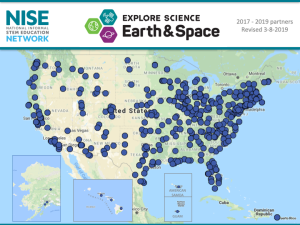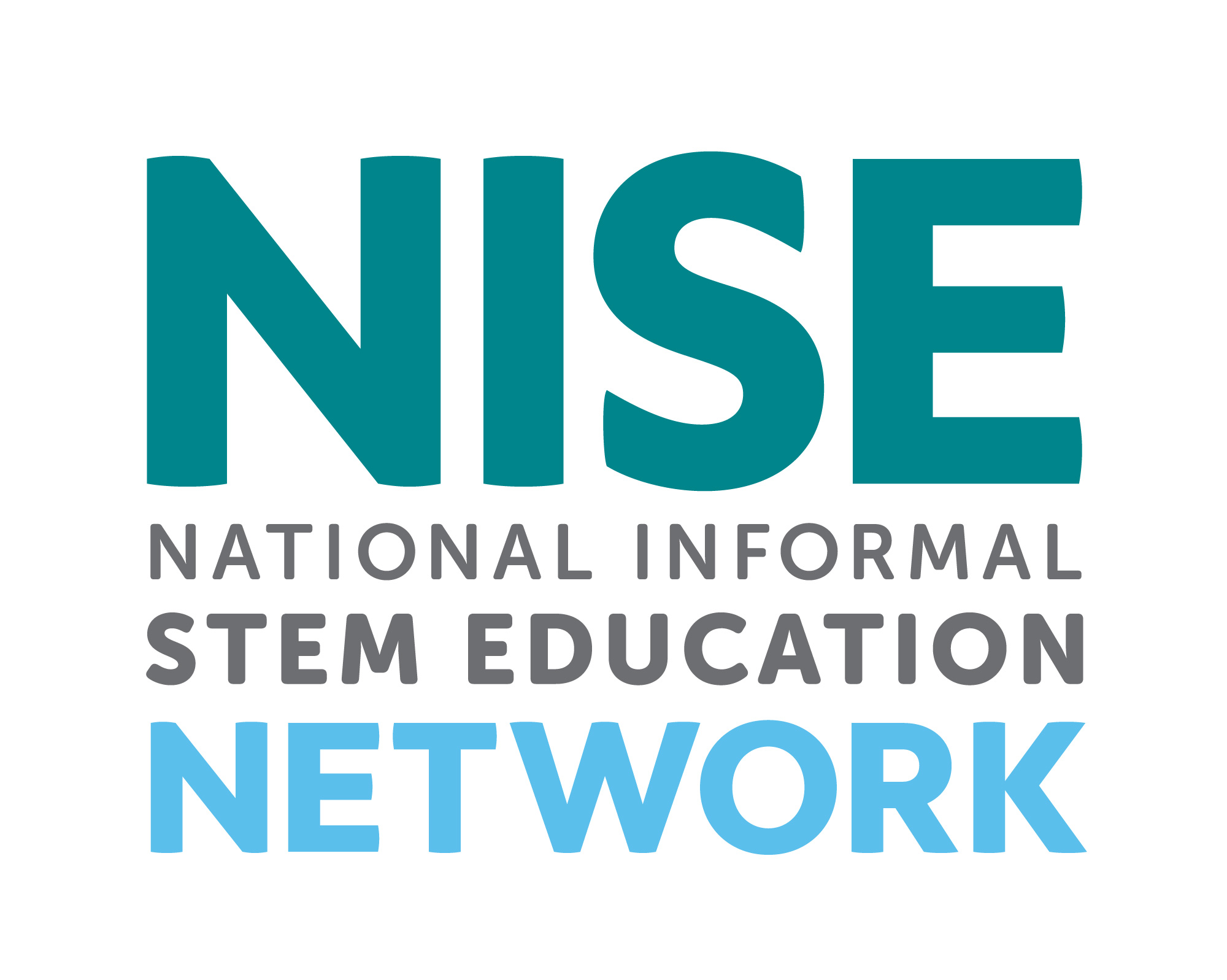 Project overview
Project overview
The Space and Earth Informal STEM Education (SEISE) project raises the capacity of museums and informal science educators to engage the public in Heliophysics, Earth Science, Planetary Science, and Astrophysics and their social dimensions. SEISE has created four hands-on activity toolkits and a small footprint exhibition, and offers a variety of ongoing professional development.
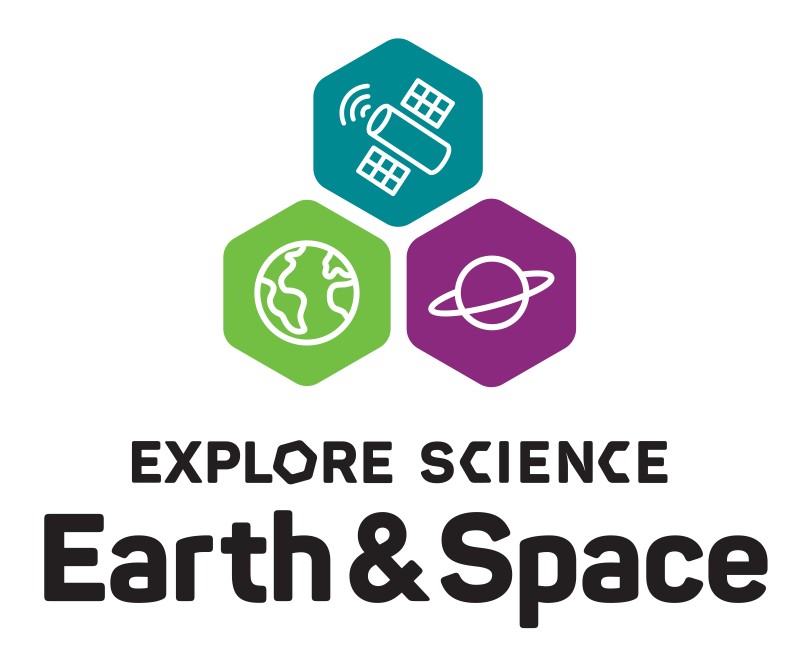
SEISE is part of the Science Activation (SciAct)program of the NASA Science Mission Directorate. SciAct projects are working together to implement a new strategic approach to engaging learners of all ages in NASA science education programs and activities. SciAct projects connect NASA science experts, real content, and experiences with community leaders to provide opportunities to do science in ways that activate minds and promote deeper understanding of our world and beyond.
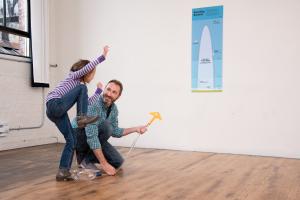
Opportunities for NISE Network Partners
Both new and existing NISE Network museum partners located in the United States are invited to participate in SEISE project activities. Opportunities include:
- Explore Science: Earth & Space hands-on activity toolkits are available for free download
- Sun, Earth, Universe small footprint exhibition resources are available online
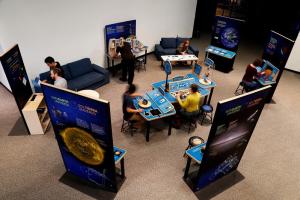
- Online workshops are recorded for ongoing use by informal educators
- Making Earth & Space Science More Relevant and Inclusive resources
This resources are based on materials developed for the NISE Network’s Earth & Space Project-Based Professional Learning Community which took place in 2021-2022
Physical toolkits
-
Partners who received an
Explore Science: Earth & Space toolkit (2020) 350 copies Part A and Part B -
Partners who received an
Explore Science: Earth & Space toolkit (2019) 350 copies -
Partners who received an
Explore Science: Earth & Space toolkit (2018) 250 copies -
Partners who received an
Explore Science: Earth & Space toolkit (2017) 250 copies
Reports
NISE Network partners who received a physical Explore Science: Earth and Space 2020 toolkit are required to submit an online report due February 15, 2021.
Learn more about how to submit online reports
Digital toolkits
Digital versions of toolkits are available for free download:
- 2017 Explore Science: Earth & Space toolkit: www.nisenet.org/earthspacekit-2017
- 2018 Explore Science: Earth & Space toolkit: www.nisenet.org/earthspacekit-2018
- 2019 Explore Science: Earth & Space toolkit: www.nisenet.org/earthspacekit-2019
- 2020 Explore Science: Earth & Space toolkit: www.nisenet.org/earthspacekit-2020
Audience
-
Activities are designed for use in children’s museums, science centers, science museums, public planetariums and observatories, and NASA visitor centers in the United States.
-
Activities are designed for family audiences with a range of experiences appropriate for visitors ages 4 through adult.
Professional Learning
- Online workshops are recorded for ongoing use by informal educators
- Making Earth & Space Science More Relevant and Inclusive resources
This self-paced course is based on resources developed for the NISE Network’s Earth & Space Project-Based Professional Learning Community which took place in 2021-2022
Evaluation
Public and Professional Impacts Summative evaluation reports (2021)
Development Process
Learn more about the NISE Network development process
Timeline
- 2016: project planning and development
- 2017: 250 copies of the 2017 toolkits shipped, corresponding online professional development workshops
- 2018: 250 copies of the 2018 toolkits shipped, corresponding online professional development workshop, first set of exhibition copies shipped
- 2019: 350 copies of the 2019 toolkits shipped, corresponding online professional development workshops, remaining set of exhibition copies shipped
- 2020: 350 copies of the 2020 toolkits shipped, corresponding online professional development workshops
- 2021-2022: ongoing professional development and implementation of resources
Project partners
The project is led by Arizona State University (Tempe, AZ), in collaboration with Science Museum of Minnesota (Saint Paul, MN), Children's Creativity Museum (San Francisco), and the Museum of Science (Boston, MA).
Project team members and advisors include:
- Afterschool Alliance, Washington, DC
- Arizona State University, Tempe, AZ
- Astronomical Society of the Pacific, San Francisco, CA
- Children's Creativity Museum, San Francisco, CA
- Children’s Museum of Houston, Houston, TX
- Emily Maletz Graphic Design, Portland, OR
- The Franklin Institute, Philadelphia, PA
- Museum of Life and Science, Durham, NC
- Museum of Science, Boston, MA
- National Girls Collaborative Project, Seattle, WA
- Science Museum of Minnesota, Saint Paul, MN
- Sciencenter, Ithaca, NY
- Space Sciences Institute, San Francisco, CA
- University of California Berkeley, CA
- University of Notre Dame, Notre Dame, IN
Partnerships include:
- Association of Children’s Museums (ACM)
- Center for Advancement of Informal Science Education (CAISE)
- Association of Science-Technology Centers (ASTC) members
- NASA Museum & Informal Education Alliance
- NASA visitor centers
- STAR Library Education Network (Star_Net) / Space Science Institute
- Visitor Studies Association (VSA)
Local partnerships may include:
- Museums
- Planetariums
- K-12 schools and teachers
- University researchers and students
- Amateur astronomers
- Out-of-school time programs
- Libraries
- Community organizations
Recipients of Explore Science: Earth & Space physical toolkits:
-
Partners who received an
Explore Science: Earth & Space toolkit (2020) 350 copies -
Partners who received an
Explore Science: Earth & Space toolkit (2019) 350 copies -
Partners who received an
Explore Science: Earth & Space toolkit (2018) 250 copies -
Partners who received an
Explore Science: Earth & Space toolkit (2017) 250 copies
Acknowledgements
This material is based upon work supported by NASA under cooperative agreement award numbers NNX16AC67A and 80NSSC18M0061. Any opinions, findings, and conclusions or recommendations expressed in this material are those of the author(s) and do not necessarily reflect the view of the National Aeronautics and Space Administration (NASA).

